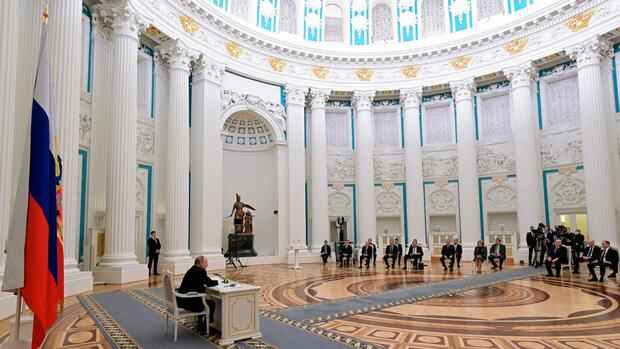Moscow Russian President Vladimir Putin has recognized the two regions of Luhansk and Donetsk in eastern Ukraine as independent “people’s republics”. The Kremlin chief signed a corresponding decree on Monday evening after a request from the separatists, as shown by state television. He also signed a cooperation and friendship treaty with the provinces that were breaking away from Ukraine.
Putin had previously informed Chancellor Olaf Scholz and French President Emmanuel Macron about his plans. The presidential administration in Moscow announced that both had governed with disappointment.
This paved the way for Russia to invade the areas in eastern Ukraine. The pro-Russian separatist leaders in Luhansk and Donetsk recently asked Putin for help in the fight against the Ukrainian government troops.
In a televised speech in the evening, Putin made serious allegations against Ukraine, the United States and NATO. He warned that nuclear weapons could be manufactured in Ukraine. “We know that there have been reports that Ukraine wants to produce its own nuclear weapons. This is not an empty boast,” said the Kremlin chief. “Ukraine actually still has Soviet nuclear technologies and delivery systems for such weapons.”
Top jobs of the day
Find the best jobs now and
be notified by email.
Putin also accused NATO of beginning an “outrageous appropriation” of Ukraine. The West wants to open up Ukraine as a “scene of possible hostilities”.
Vladimir Putin addressed the Russian people in a televised address.
(Photo: dpa)
Ukrainian Foreign Minister Dmytro Kuleba asked members of the UN Security Council for an emergency meeting in light of the latest developments. According to his wishes, steps should be discussed to guarantee the security of his country and to reduce tensions with Russia.
US President Joe Biden is consulting with his National Security Council, a government official in Washington told the Reuters news agency.
Separatist leaders had asked for assistance
The “People’s Republics” and the Russian parliament had previously asked Putin to recognize independence. The Russian Security Council supported the motions with a large majority at a special session on Monday afternoon.
Almost everyone involved, including Foreign Minister Sergei Lavrov and Defense Minister Sergei Shoigu, spoke out in favor of recognizing the regions.
The Moscow stock exchange reacted to the session with dramatic price losses: the ruble fell by more than five percent against the euro and dollar. The stock indices fell by around ten percent.
More on the subject:
Kremlin spokesman Dmitry Peskov had only explained in advance that this was not a routine Security Council meeting. The live broadcast of the event then quickly made it clear in which direction it was going: Vladimir Putin had all members of the council step in front of the microphone – and practically all of them spoke in favor of recognizing the separatist “Donetsk People’s Republic” (DPR) and “Luhansk People’s Republic”. “ (LVR) off.
While the former FSB head Nikolai Patrushev, who is considered a hardliner, advocated at least waiting for the planned meeting between Putin and Biden, the majority wanted immediate recognition. Russia owes this to the children and women in Donbass, said the head of the Federation Council, Valentina Matviyenko.
The Security Council said that neither Ukraine nor the West needed the Donbass. Deputy Chairman of the Security Council Dmitry Medvedev said it was clear to Russia that the step would have serious consequences in view of the sanctions threatened by the West. In view of the situation, however, there is no other option than to recognize the areas.
The pressure on Russia will be unprecedented, Medvedev said. The hope is, however, that the conflict will cool down afterwards.
Medvedev: Russia has learned to live with the pressure
Medvedev recalled his time as president when the war with Georgia broke out in 2008. At that time, Russia had recognized the breakaway regions of South Ossetia and Abkhazia as states and stationed thousands of soldiers there. Since then, Russia has learned to live with the pressure.
Foreign Minister Sergei Lavrov, who just a few days ago still saw potential for negotiations in the talks with the USA, justified his support for the recognition of the sovereignty of the two provinces by saying that Kiev is not adhering to the Minsk Agreement. The Ukrainian President Volodymyr Zelenskiy also made it known behind closed doors that Ukraine did not want to stick to it at all.
The most aggressive demand was made by Russia’s Interior Minister Vladimir Kolkoltsev: he called not only for the recognition of the existing separatist areas, but also for their restoration in the original borders of the Donetsk and Luhansk regions. In any case, this demand would mean war, as it would result in an invasion of the areas previously controlled by Kiev – that is well over half of the Donbass.
Similar procedure as in 2014 before Crimea was annexed
Several speakers also recalled Russia’s incorporation of the Ukrainian Black Sea peninsula of Crimea in 2014, which Moscow carried out despite protests from the West. Last week, the Russian parliament passed a resolution to Putin asking him to recognize the “Luhansk and Donetsk People’s Republics”.
Putin himself closed the Security Council meeting by saying that he had now heard all points of view. “I’ll make a decision later today,” he said.
It is possible that the actual decision was made before the meeting and this only served to give Putin official backing. The Russian leadership acted similarly when it convened the upper and lower houses of parliament in 2014 to authorize Putin to intervene in Crimea.
Violence has increased significantly in the Donbass conflict zone. Government troops and pro-Russian separatists are shooting at each other. According to UN estimates, more than 14,000 people have died in the eight-year conflict, most of them in separatist-controlled territory.
With agency material
More: Finding the Spark – How Putin could justify an invasion
